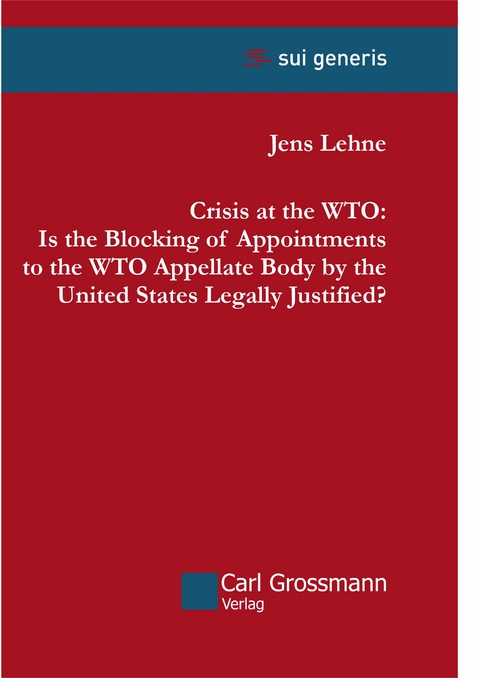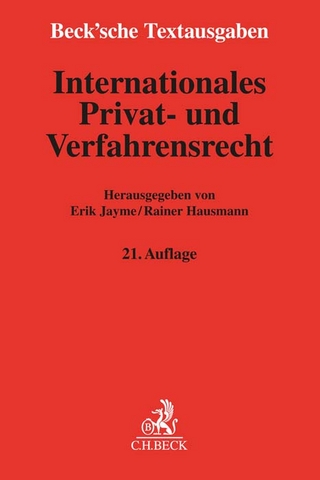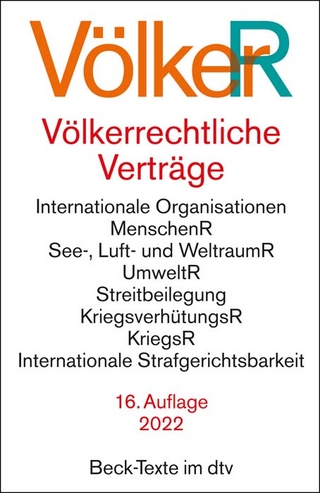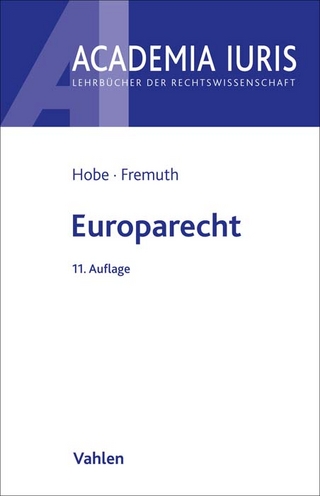
Crisis at the WTO: Is the Blocking of Appointments to the WTO Appellate Body by the United States Legally Justified?
Carl Grossmann Verlag
978-3-941159-40-2 (ISBN)
Jens Lehne is professor of public economic law at the School of Management and Law of the Zurich University of Applied Sciences. He specializes in constitutional law, WTO law, and EU law. Jens Lehne is professor of public economic law at the School of Management and Law of the Zurich University of Applied Sciences. He specializes in constitutional law, WTO law, and EU law.
The dispute settlement system of the World Trade Organization (WTO) has been described by the first Director-General of the WTO, Renato Ruggiero, as „in many ways the central pillar of the multilateral trading system“, and it is one of the most active dispute settlement systems in international law. Since its inauguration in 1995 until August 2019, WTO member states have filed altogether 587 complaints, which have resulted so far in more than 250 panel reports and about 140 Appellate Body reports. Compared to its predecessor, the GATT dispute settlement system (1948 – 1994), the WTO dispute settlement system is more effective and more legalized. Under the old system, both the establishment of a dispute settlement panel and, following the panel proceedings, the adoption of the panel report required the consensus of all member states (positive consensus), which gave each member state, including the respondent in the case, the power to block the establishment of a panel or later the adoption of the panel report. This problem of blockage, and, more generally, insufficient enforcement mechanisms within the GATT system developed into a major issue for the United States in the 1980 s and early 1990 s. It reacted with the threat of unilateral trade sanctions, which in turn seriously worried its trading partners. The new WTO dispute settlement that emerged from the Uruguay Trade Round (1987 – 1994), embodied in the understanding on Dispute Settlement (DSU), addressed these concerns. The Dispute Settlement Body (DSB), in which all member states are represented, now establishes panels and adopts their reports unless all members disagree (negative consensus), meaning that the establishment of panels and the adoption of reports have become quasi-automatic. In addition, if a member state does not comply with the recommendations of a report, the complaining party can request the SB to authorize trade sanctions, which are also subject to the negative consensus rule. In return for this more powerful multilateral enforcement mechanism, the US accepted a prohibition of unilateral sanctions. Finally, and most importantly in our context, since panel reports could no longer be blocked, and a number of panel reports had been criticized in the past for the low quality of their legal reasoning, the member states sought another way to deal with legally faulty reports. To that end, they created a standing review body, the Appellate Body, to which a party can appeal for a review of legal interpretations of a panel. The reports of the Appellate Body, like those of the panels, are adopted by the DSB by negative consensus. Despite its successes, this effective and binding dispute settlement system is today under an existential threat. Since mid-2017 the US has blocked all appointments of new members to the Appellate Body, and it shows no signs of changing this policy. As a consequence, only three of the seven seats on the Appellate Body are currently occupied. If nothing unexpected happens, the number of sitting Appellate Body members will drop to only one in December 2019, when the terms of two of the three sitting members will end. Since three Appellate Body members are required for the disposition of an appeal, this means that from December 2019 onwards the Appellate Body will no longer be able to hear new appeals. In that situation, by filing a notice of appeal a party could suspend dispute settlement proceedings indefinitely. In effect, this would give each party the power to block the adoption of a panel report, thus returning the dispute settlement system to pre-WTO times. Various aspects of this grave crisis of the WTO dispute settlement system have already been discussed in the literature. This study adds three elements. First, it describes, based on a detailed review of the minutes of DSB meetings since 2017, how a dispute that seemed initially to be about obscure issues of appointment procedure, baffling many observers, turned into the most severe crisis of the WTO dispute settlement system yet. It gives an account of the shifting reasons offered by the US for its blockage, culminating, in August 2018, in broad accusations of judicial overreach and disregard of WTO rules by the Appellate Body. The US alleges that the Appellate Body has been engaging in such overreach, on the one hand, in the area of substantive law, and, on the other hand, with regard to six distinct issues of procedure and interpretive approach. Its focus in the DSB, though, has been on the latter, and it has presented to the member states extensive statements on all of these six issues. Second, and mainly, the study analyzes each of the six procedural and interpretative issues raised by the US, and asks, from a legal point of view, whether the Appellate Body has indeed overstepped its mandate with regard to any of these issues, and whether the Appellate Body’s jurisprudence on these issues, either individually or as a whole, can justify the blockage of appointments to the Appellate Body. For that purpose, it will take a particularly close look at the statements of the US in the DSB, and the reactions of other WTO members to these statements. Third, it will put the detailed analysis of the reasons stated by the US for its blockage in a larger legal and political context in order to get a better understanding of the motives driving the US. The structure of the study follows this outline of its main contributions. Chapter II lays the basis by briefly explaining the rules on appointments to the Appellate Body and discussing past experiences with the appointment process. Chapter III chronicles the development of the current crisis, from early 2017 until today. Chapter IV, the central part of the study, contains a detailed analysis of the issues of procedure and interpretative approach that the US has invoked as reasons for its blockage, and answers the question whether these reasons can legally justify the blockage. Chapter V places the often narrow and technical legal reasons in a broader explanatory framework. Chapter VI concludes with a summary of the main results and a few thoughts on whether a better understanding of the legal reasons stated by the US for its blockage can contribute to a resolution of the appointment crisis.
The dispute settlement system of the World Trade Organization (WTO) has been described by the first Director-General of the WTO, Renato Ruggiero, as "in many ways the central pillar of the multilateral trading system", and it is oneof the most active dispute settlement systems in international law. Since its inauguration in 1995 until August 2019, WTO member states have filed altogether 587 complaints, which have resulted so far in more than 250 panel reports and about 140 Appellate Body reports. Compared to its predecessor, the GATT dispute settlement system (1948 - 1994), the WTO dispute settlement system is more effective and more legalized. Under the old system, both the establishment of a dispute settlement panel and, following the panel proceedings, the adoption of the panel report required the consensus of all member states (positive consensus), which gave each member state, including the respondent in the case, the power to block the establishment of a panel or later the adoption of the panel report. This problem of blockage, and, more generally, insufficient enforcement mechanisms within the GATT system developed into a major issue for the United States in the 1980 s and early 1990 s. It reacted with the threat of unilateral trade sanctions, which in turn seriously worried its trading partners. The new WTO dispute settlement that emerged from the Uruguay Trade Round (1987 - 1994), embodied in the understanding on Dispute Settlement (DSU), addressed these concerns. The Dispute Settlement Body (DSB), in which all member states are represented, now establishes panels and adopts their reports unless all members disagree (negative consensus), meaning that the establishment of panels and the adoption of reports have become quasi-automatic. In addition, if a member state does not comply with the recommendations of a report, the complaining party can request the SB to authorize trade sanctions, which are also subject to the negative consensus rule. In return for this more powerful multilateral enforcement mechanism, the US accepted a prohibition of unilateral sanctions. Finally, and most importantly in our context, since panel reports could no longer be blocked, and a number of panel reports had been criticized in the past for the low quality of their legal reasoning, the member states sought another way to deal with legally faulty reports. To that end, they created a standing review body, the Appellate Body, to which a party can appeal for a review of legal interpretations of a panel. The reports of the Appellate Body, like those of the panels, are adopted by the DSB by negative consensus. Despite its successes, this effective and binding dispute settlement system is today under an existential threat. Since mid-2017 the US has blocked all appointments of new members to the Appellate Body, and it shows no signs of changing this policy. As a consequence, only three of the seven seats on the Appellate Body are currently occupied. If nothing unexpected happens, the number of sitting Appellate Body members will drop to only one in December 2019, when the terms of two of the three sitting members will end. Since three Appellate Body members are required for the disposition of an appeal, this means that from December 2019 onwards the Appellate Body will no longer be able to hear new appeals. In that situation, by filing a notice of appeal a party could suspend dispute settlement proceedings indefinitely. In effect, this would give each party the power to block the adoption of a panel report, thus returning the dispute settlement system to pre-WTO times. Various aspects of this grave crisis of the WTO dispute settlement system have already been discussed in the literature. This study adds three elements. First, it describes, based on a detailed review of the minutes of DSB meetings since 2017, how a dispute that seemed initially to be about obscure issues of appointment procedure, baffling many observers, turned into the most sever
| Erscheinungsdatum | 15.10.2019 |
|---|---|
| Reihe/Serie | Sui Generis ; 6 |
| Verlagsort | Berlin |
| Sprache | englisch |
| Maße | 155 x 230 mm |
| Themenwelt | Recht / Steuern ► EU / Internationales Recht |
| Schlagworte | Appellate body • Judicial Activism • Settlement of international disputes • Völkerrecht • Wirtschaftsvölkerrecht • World Trade Organisation • WTO • WTO-Recht • WTO-Streitbeilegungsverfahren |
| ISBN-10 | 3-941159-40-2 / 3941159402 |
| ISBN-13 | 978-3-941159-40-2 / 9783941159402 |
| Zustand | Neuware |
| Haben Sie eine Frage zum Produkt? |
aus dem Bereich


